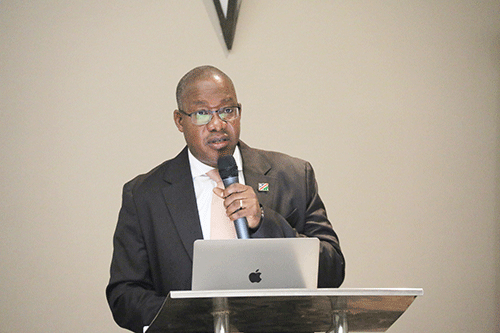The World Health Organisation (WHO) and United Nations partner agencies have commended Namibia on its path to eliminating HIV, syphilis and hepatitis B virus transmission from mother to child.
WHO Officer in Charge Mary Brantuo said they are ecstatic that Namibia has remained as determined as ever to move with this aspiration to eliminate mother-to-child transmission – not only of HIV and syphilis but also of hepatitis – the Triple Elimination Initiative.
“Namibia is, therefore, the first high-burden country in the region to apply for triple elimination validation. This is a huge achievement, and we commend you on this effort,” said Brantuo yesterday during the opening session of the regional validation committee’s joint mission to Namibia.
The Triple Elimination Initiative supports the global commitment to the elimination of mother-to-child or vertical transmission of HIV, syphilis and hepatitis B virus (HBV).
She said this has catalysed maternal and child health services to expand capacity to address vertical transmission and encourages countries to simultaneously commit to the elimination of mother-to-child transmission (EMTCT) and further push a harmonised approach for integrated service delivery to improve health outcomes for mothers and children. “This is in line with the new Global Health Sector Strategy for HIV, Viral Hepatitis and STIs 2022-2030 with a vision to end epidemics and advance universal health coverage, primary health care and health security in a world where all people have access to high-quality, evidence-based and people-centred health services,” said Brantuo.
She said Namibia’s exceptional political, administrative, as well as financial leadership and support, plus the strong in-country partnership, are largely responsible for the significant progress made toward EMTCT for these three infections.
Health ministry executive director Ben Nangombe stated that some people imply the term ‘mother to child’ means the mother is responsible, further requesting people to desist from such notions and ideologies.
“That doesn’t sound correct; we need to perhaps adopt new terms, and there is a reference to vertical transmission or perinatal transmission of the disease, which are more neutral. It should not be made to sound like the mothers are responsible for transmitting the virus to their unborn baby,” he stated.
Nangombe said government, through the ministry of health and other government sectors, will continue to strategically engage with development partners, non-governmental organisations and the private sector to ensure equitable elimination of mother-to-child transmission service provision and sustainability at all levels.
The National Validation Committee, with support from the health ministries and partners, conducted a pre-validation assessment in a consultative approach, using standardised tools recommended by the WHO Global Validation Advisory Committee.
Nangombe said the programme data indicates that Namibia is doing well with HBV antenatal testing and antiviral prophylaxis coverage, as well as HBV immunisation at birth for infants.


